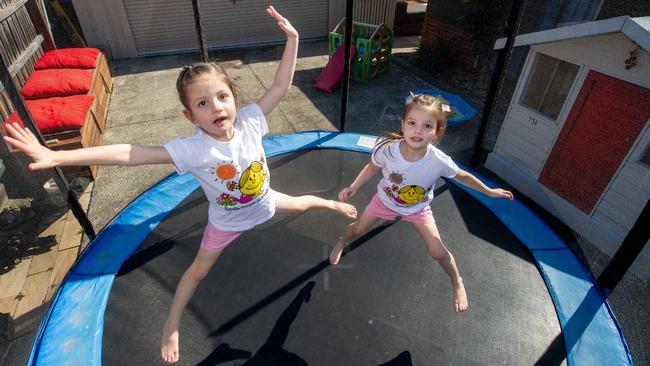Acrobatic stunts cause third of all trampoline injuries, study finds
A NEW study shows most trampoline injuries occur at home, but children hurt at commercial parks suffer more expensive injuries and spend longer in hospital. But a third of all injuries are due to kids trying to attempt certain stunts.

CHILDREN hurt at commercial trampoline parks have more expensive injuries and spend longer in hospital than those jumping at home, a new study shows.
Acrobatic stunts that cause a third of all injuries should be banned at such parks, researchers from the University of Adelaide and Women and Children’s Hospital say.
Their survey of 392 children shows the majority of trampoline injuries occur at home, with most caused by children falling onto hard surfaces or hitting other objects.
HOW ‘TECHNOFERENCE’ RUINS PARENT/KID RELATIONSHIPS
“The majority of children attempting acrobatics were attempting backflips, flips or somersaults,” study co-author Nicole Williams said.
“Unique injury mechanisms included jumping off a roof or balcony onto the trampoline, bouncing sideways off, and playing tag or wrestling on the trampoline.
“The presence of safety equipment at private homes was only documented in 29 cases, and 25 injuries were related to the failure of netting surrounding the trampoline.”

Assoc Prof Williams said safety would be improved with a new Australian Standard mandating spring-free and soft-edge trampolines.
“As these trampolines may be more expensive, incentives to purchase, such as buyback and demolition of old and unsafe products, may be of assistance, along with government subsidy for proven safer models,” she said in the Journal of Paediatrics and Child Health.
Broadmeadows mother of two Alicia Sanza said she had taken a number of precautions to ensure her twin five-year-old girls remain safe.
“We bought a trampoline that has padding around the sides and the net all around it. They must have it zipped closed before bouncing, be wearing no shoes and stop bouncing if someone wants to get in or out,” she said.

The survey showed 69 per cent of injuries occurred at a private home and 19 per cent at a commercial trampoline park.
The rest happened at school or in a gym. Most cases resulted in costs of between $500 and $4300 for each injury.
About 17 per cent required hospital admission and 12 per cent surgical intervention with no difference in admission rates between commercial and private locations.
Commercial trampoline park injuries were more expensive to treat and children needed to stay in hospital longer.


